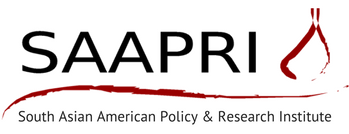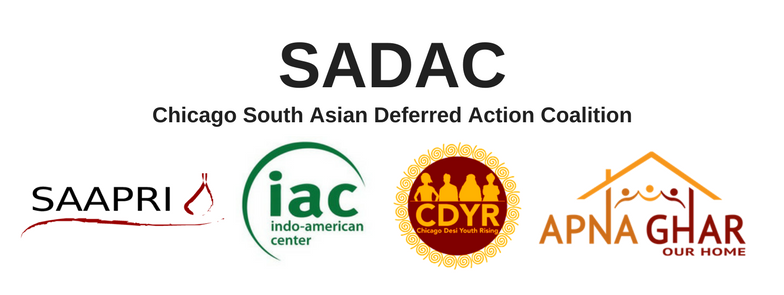DACA DECISION HIGHLIGHTS NEED FOR CONGRESSIONAL SOLUTION AND LOCAL MUNICIPAL ID POLICIES THAT SUPPORT UNDOCUMENTED IMMIGRANTS & SOUTH ASIANS
Chicago, IL – The President’s decision to end Deferred Action for Childhood Arrivals (DACA) in six months has injected tremendous uncertainty and fear into the lives and communities of over 800,000 DACA recipients. If the program expires, DACA recipients will lose their work authorization, their protection from deportation, and the relative stability granted to them by DACA protection. The Chicago South Asian Deferred Action Coalition (SADAC), comprised of SAAPRI, Chicago Desi Youth Rising, Apna Ghar, Inc., and Indo-American Center (IAC), strongly opposes the DACA rescission and is deeply concerned about the result that termination of DACA will have on DACA recipients. SADAC strongly urges Congress to pass a clean bill to protect DACA recipients before the end of this year.
SADAC is particularly concerned with how this announcement will affect DACA recipients and the undocumented population in the South Asian community. According to 2014 estimates from the Migration Policy Institute (MPI), there are 317,000 undocumented immigrants in the U.S. from India and Pakistan (data for other South Asian immigrant groups are unavailable). In Cook County, there are an estimated 14,000 Indian and Pakistani undocumented immigrants (4.3 percent of the County’s undocumented population). Additionally, there was a total of 3,741 DACA recipients from India as of March 2017. One of these DACA recipients, Chirayu, told SADAC that the recent DACA announcement has left him and other DACA recipients feeling “like the floor underneath us has been taken out.” For Chirayu, the next goal must be a permanent legislative solution on DACA, adding that “Congress must not gamble with our lives to score political points.”
With the uncertainty regarding DACA on the federal level, there is a growing need for more local solutions that protect and empower undocumented immigrants. One such local policy is a Municipal ID program, which increases access to official government-issued ID for those currently unable to obtain one. The ID card would serve as a proof of identity and residency, allow individuals to access essential local services that require an ID (e.g., opening a bank account, seeking government services, or going to the doctor), and give them a firmer footing when operating in the public sphere and interacting with law enforcement.
The City of Chicago approved a Municipal ID program in April 2017 and is currently in the process of implementing the program. Based on the number of undocumented South Asians in Cook County and the current distribution of South Asians within the County, we estimate that at least around 5,000 undocumented South Asians could benefit from the City’s program. The Cook County government is also exploring a similar program. The City and County must make sure to work collaboratively with immigrant communities during the planning and implementation of these programs to ensure that their privacy and data security concerns are met. Retaining minimal personally indefinable information and maintaining a restricted and secure database for this information is essential for community members to trust the program and for the program to be effective.
While a Municipal ID may mitigate the impact of the DACA repeal in some ways, it is not a substitute for DACA; Municipal ID does not grant cardholders protection from deportation, work authorization, or any type of legal protection. It is therefore most crucial for Congress to act quickly to save these DACA protections. At the same time, SADAC believes we should do what we can on the local level to maximize protections and access to opportunities for undocumented immigrants. In this state of uncertainty, a program like Municipal ID is needed more than ever.

